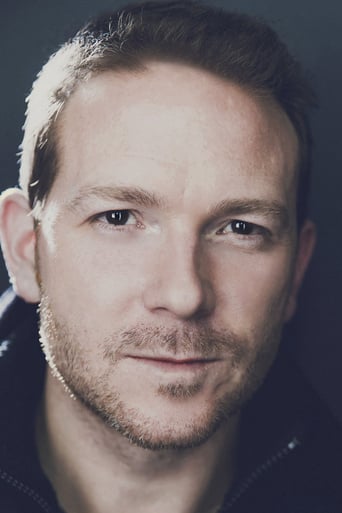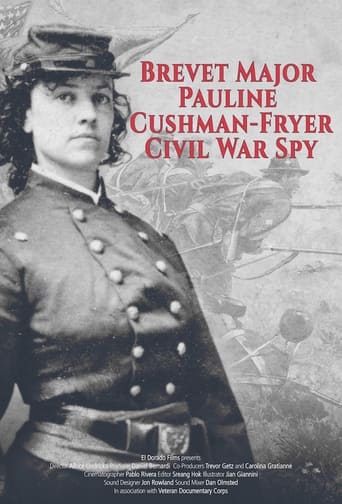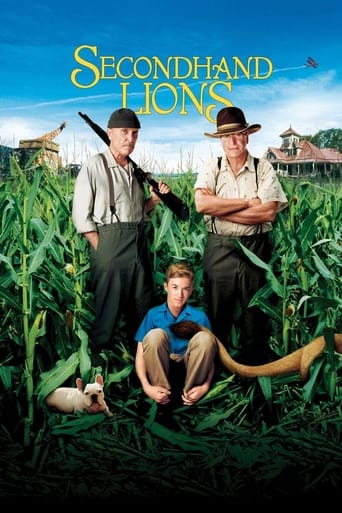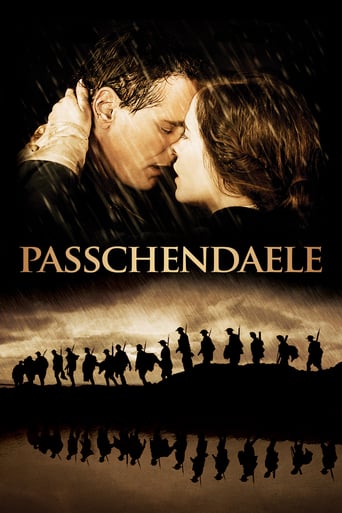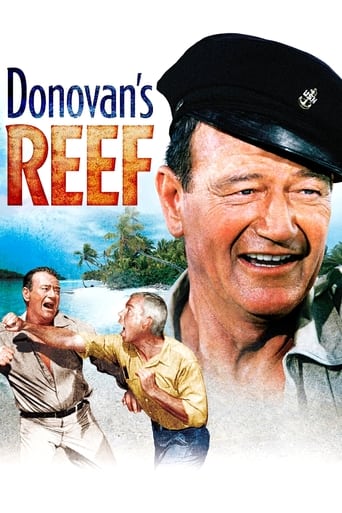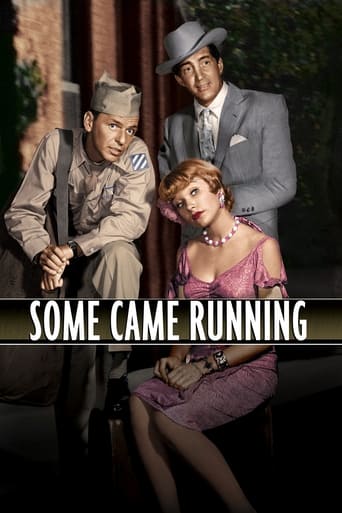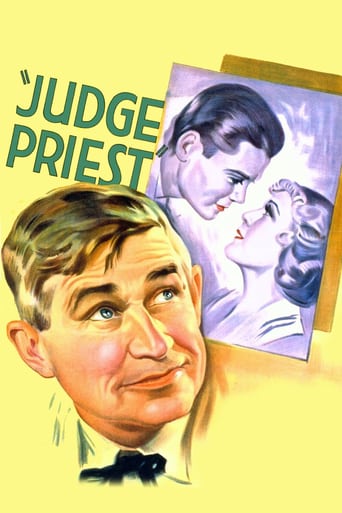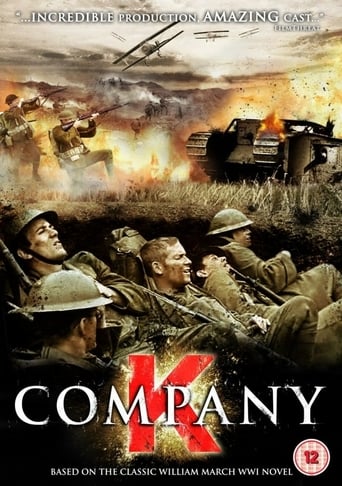

Company K (2004)
Based on the popular World War I novel by author William March, director Robert Clem's COMPANY K follows a veteran of the first great conflict as he finishes a book about his wartime experiences and reflects on how a man's true character is revealed through his actions on the battlefield. From the German soldier who visits him in dreams to the camaraderie that is forged by fighting together and the true gravity of laying down your life for a greater cause, World War I veteran Joe Delaney will attempt to exorcise his demons through writing while struggling to readjust to small-town life following the trauma of war.
Watch Trailer
Cast


Similar titles
Reviews
Sorry, gang, but this film, "Company K" was awful! Lets start with a forced and contrived plot line, complete with banal and clichéd dialog, delivered in wavy line readings, by wooden actors, playing the usual array of depressing stereotypical Infantry soldiers! This movie, shot in Pennsylvania,looks about as much like a World War One Battlefield as the Mall of America!There have been too many ultra-realistic War Movies made in the last twenty years to allow this dud, with it's back yard production effects, to even appear to be authentic! The actors look unsure of their roles, as Marines, especially when maneuvering on a battle field! The special effects is bush league, at best, with wimpy looking gore,and tomato ketchup blood! "No Man's Land" looks like the poorly maintained yard of that cranky old "difficult" guy, in some suburban neighborhood! Grass didn't grow near the trench system!I love the fake 1903 Springfield Rifles! Somewhere, an American Legion Chapter is missing its Honor Guard Rifles! If the German Army on World War One had fought like the Germans in this movie, the war would have been over in a month!Forget this Turkey, folks! It gives "Fake" a bad name!
Company K by Robert Clem is a serious work that should be seen, and, more importantly, re-seen.The film begins with a quotation from William March's autobiographical World War I novel of the same name, but it could have begun with the quotation from Erich Maria Remarque's novel, All Quiet on the Western Front: "This book is neither an accusation nor a confession. It will simply tell of a generation of men who, even though they may have escaped its shells, were destroyed by the war." There are differences. Remarque's book was about German soldiers, whereas Company K is about American soldiers. And Company K is more of an accusation and a confession, although the film has an overall documentary feel.The plot is a string of episodes, each focusing on a key experience of a different soldier in the unit. The structure follows March's plan for his book where each story is placed on a wheel and the wheel spun "in an unending circle of pain." Some viewers might find this narrative structure too unusual because there isn't really a high climax. The end of the war is simply a brief episode bridging to the postwar traumas of Private Joe Delaney (March) and others. This anticlimactic episode is handled subtly: The soldiers don't jump up and throw their helmets in the air; they sigh, stare dumbly, and drop their helmets to the ground.Many other episodes have similar ironic strength. A country soldier who has never seen an airplane exclaims one's approach; he is strafed. Inexperienced officers talk Ivy League politics but make battlefield blunders; one attempts suicide and another is murdered by an exhausted enlisted man. Two soldiers with grumbling stomachs eat blood-soaked enemy pumpernickel. An experienced French prostitute admits that she had promised to save herself for her boyfriend until he was killed early in the war.In a prologue scene before the opening credits, Delaney tells his wife of his book about the war. She advises him to leave out the part about murdering a group of German prisoners. It's a well-chosen prologue -- the events surrounding that episode and its aftermath are the film's most powerful.The young actors are excellent and perform with conviction. Dialog is well written and delivered. The authenticity of uniforms, weapons, vehicles, and battlefield locations is impressive. There is no cast of a thousand extras, but the judicious use of actual WWI footage expands the scope some.Company K is one of those few films that get better with re-seeing. Fresh nuances appear each time wiping blood off bayonets, soldiers crossing themselves as shells falls on friends, battle-fatigued faces and the effect grows. This film ought to be studied alongside the novel in college courses.
Company K is an outstanding war film that tells a great story without resorting to clichés or stock characters. The story lines of the various members of the company weave a compelling tale of marines in World War I. They experience the discipline and training of boot camp and go off to war not expecting that death can come from unexpected places. For example, a sergeant and his squad are wiped out by an incompetent Lieutenant's order and a marine private is knifed by a boyish German prisoner while trying to play a trick on the prisoner.I read the book by William March and the movie was pretty faithful to the book. I recommend this movie to others.
Before he found his writer's voice, writer William March spent the better part of fifteen years thinking about the horrors he experienced as an infantryman in World War One. The book was titled "Company K," and has become a war classic alongside "Johnny Got His Gun" and "All Quiet on the Western Front." Seventy years following the book's publication, filmmaker Robert Clem has converted March's story into an accessible and engaging documentary."Company K" is Clem's latest, and in my opinion, best work. The film provides a stark and compelling look at the First World War in which 100,000 American men died, although the memory of that war has virtually vanished. (I know Robert Clem and his work from the documentary he made partly of the life of my grandfather, in another WWI film "War Birds: Diary of an Unknown Aviator.")Using a score of vignettes that roughly follow March's written format, the film portrays war's farce and horror. Here is a young soldier joining his cohorts in a French bar. One of the hostesses seduces the man by telling how her husband recently died on the Front. It might have turned into a love story, except for the fact that as soon as they return to the bar, she moves on to the next soldier. Our naive protagonist is initially dumbstruck, and then becomes enraged, attacking his company mates. A nice allegory of how war operates on the push-pull emotions of lust and betrayal. Another off-battle scene could easily have occurred in peacetime. The company's commanding office bullies his men relentlessly, tearing up their shore passes one by one as he throws their washed clothes into the mud. "Wash them again," he commands. The men are crestfallen. These opening scenes quickly move to grittier stuff. If it's gore you're looking for, you won't be disappointed. The violence is low key--and devastating. One scene shows two soldiers coming across a dead German. The men are hungry, and discover a loaf of bread on the dead man. The scene might not work in color, as the realism could prove a distraction. When the men discover the bread to be soaked in the soldier's blood, they hesitate. One after the other they dig in, swallowing every bite. Another scene develops more slowly. Americans are ordered to shoot German prisoners. At first the men resist, but then comes the clincher. "These prisoners are not really surrendering," the sergeant tells them. "It's an old trick. The sergeant's words prove effective. His men's astonished sense of betrayal pushes them into slaughtering their counterparts. The scene proves to be a harrowing preview of the Nazi techniques used twenty years later. Company K is particularly instructive in today's political turmoil. You won't hear any arguments among academics or war hawks that the Great War lived up to its name, or succeeded in making the world Safe for Democracy. In Robert Clem's "Company K," we experience what poet Robert Lowell called war's "blundering butcher" as it tromped across Europe and left scars that remain with us today.


